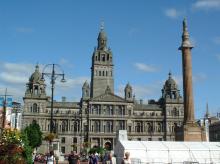The Invisible Language

It is important to remember that what is spoken in the Glasgow area today is not spoken in isolation but forms part of a wider entity which is the Scots language. While Glaswegian Scots might be distinct from other forms it cannot be separated from them. Each form of Scots, each region, merges gradually into the speech of its neighbour.
Scots in Glasgow has become an invisible language, spoken but rarely acknowledged. To date, Glasgow council, heritage industries and commercial ventures have promoted some languages but have been slow to consider the huge potential of using the Scots language to sell the region, attract tourism and boost the confidence and identity of a population which has, arguably, suffered from a great deal of cultural and social exclusion in the recent past.
For more on the history, status and use of Scots in the Glasgow region, please click on the various features located on the left hand menu. In 'Glasgow Beginnings' learn about Scots in Glasgow before 1700. In 'Breaking the mould' read about changes in the 19th century.
To hear a traditional ballad in Scots from Glasgow please click on the 'Bleacher Lassie o Kelvinhaugh' at the top of the left hand menu above.